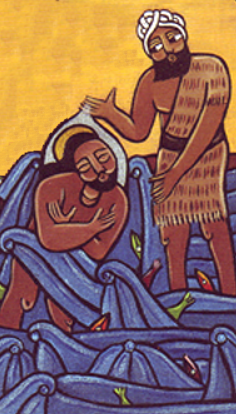[I'm a little late. This is the sermon for March 25]
The psalm for this day calls for a story. The scribes who assembled the poems and songs that eventually became the collection we know as the book of Psalms, gave this psalm a short introductory note, “A Psalm of David, when the prophet Nathan came to him, after he had gone in to Bathsheba.”
That is quite a story. It begins in the spring of the year, the time when kings go out to battle – but that year king David sends his generals out and he himself stays in Jerusalem. Late one afternoon, he rises from his couch and, walking about on the roof terrace, he sees a woman bathing, a very beautiful woman. He sends someone to find out who she is, learns that her husband is out with the army, and he sends for her.
She comes over, they have a couple of drinks, they make love, and she goes home. A few weeks later, there’s a message for the king. David opens the envelope and reads it. “I’m pregnant. Bathsheba.”
David concocts a plan to hide the consequences of his adulterous affair. He calls Bathsheba’s husband, Uriah back from the front lines, scheming to make him think the child is his own. “Go home, take a break,” he says, “spend a little time with your beautiful wife.”
But David is in for a royal surprise: Uriah refuses to go home, saying that he cannot indulge himself in such pleasures while his men are left in the battlefield.
The king resorts to making him drunk, yet Uriah, ever the good soldier, still resists the comfort of his wife’s bed; he spends the night camping out with the other officers.
Now the plot thickens as David moves another step deeper into the morass. He orders his general Joab to put Uriah in the front lines where the fighting is fiercest, and to make sure he dies there for king and country. And so it happens. Word comes that Uriah has been killed in action.
On hearing the news of her husband’s death, Bathsheba laments. After the period of mourning is over, David sends for her and she becomes his wife. The king gets what he wants. End of story? Not quite.
The prophet Nathan comes to the palace and tells the king about a rich man who has stolen a poor man’s only lamb and slaughtered it for dinner. The king is furious, “That is an outrage! Not in my kingdom! The man who has done this deserves to die!”
“You are the man,” says Nathan.
That is when the fog of power and self-absorption finally lifts, and David realizes what he has done.
 This psalm, the scribes wrote in the margins of their scrolls, this psalm is the sort of prayer that fits such a moment of sudden clarity when your knees buckle and your soul drains through the soles of your feet. This Psalm is not the quickly written apologetic press release you’d expect from a powerful man who happened to get caught. Psalm 51 is a deep and honest reflection, a “liturgy of the broken heart.”
This psalm, the scribes wrote in the margins of their scrolls, this psalm is the sort of prayer that fits such a moment of sudden clarity when your knees buckle and your soul drains through the soles of your feet. This Psalm is not the quickly written apologetic press release you’d expect from a powerful man who happened to get caught. Psalm 51 is a deep and honest reflection, a “liturgy of the broken heart.”
Just about every word from the vocabulary of human sinfulness is listed in the opening lines: my transgressions, my iniquity, my sin, the evil I have done in your sight – it’s like there aren’t enough words for the horror, the guilt, and the shame. We are listening to the voice of a grown up human being who reflects on our common capacity to do evil.
But this is not just David’s prayer. The “I” that speaks in this psalm are God’s people Israel who recognize themselves in these words, and it doesn’t end with them. The “I” that speaks here is all of humanity, all the sons and daughters of Adam and Eve at the moment when the fog of our self-absorption lifts and we realize our capacity for evil. This prayer allows us to reflect on the universality of sin without wallowing in confessions of guilt like pigs in a mud pit. This psalm encourages us to see ourselves in the light of God’s judgment and of God’s power to redeem, restore and renew.
Before the litany of sin that dominates the opening verses, the prayer appeals to the character of God who is merciful and whose steadfast love and tender compassion have been affirmed by generations of God’s people. The only place to reflect on what Scripture calls sin, according to this psalm, is in the light of God’s grace. Much of what sin entails can only be seen in that light, rather than the dim rays of a guilty conscience.
Sin is not a churchy word for doing the wrong thing or breaking the law. Sin is the name given to our broken relationship with God, a brokenness that impacts how we relate to ourselves, to each other, and to the world. Sin is what rules us when we imagine ourselves as gods instead of creatures of God. Sin is what distorts every aspect of our thinking, speaking, and doing, when we fail to know ourselves and one another as God’s own. Sin is like being completely out of tune in a creation that sings the glory of God.
Many prayers for help say, “Change my situation, so I may praise you.” But this one says, “Change me; I am the problem.” We learn to say from a very young age, “I’m sorry. Can we start over?” We ask for a clean slate, for a new beginning that disregards the past. But this prayer rises from a place of deeper insight. Sin is not an occasional thing, something we do now and then, but rather a reality that pervades our lives and distorts our entire being.
Psalm 51 comes from the place where the fog of our self-assured autonomy lifts, and we suddenly see that we are not who we imagined ourselves to be. “I don’t recognize myself anymore, and I can’t put myself back together. Wash me in your mercy. Recreate me in your grace.”
A clean slate will not do. Create in me a clean heart. Create in me a heart that is free of all that alienates me from you, for I cannot be myself without you.
In this prayer, and quite often in Scripture, heart does not refer merely to an organ, a part of the body. It is rather understood as the center of our consciousness, that through which we perceive the world around us and express what is within us. The heart is like a hub where our sensibility, our imagination, our mind and will come together to shape our perception and give direction to our actions. And Scripture insists that we have a heart problem. We have hearts that gravitate toward pride and fear and idolatry. That is why the psalm doesn’t rise from the heart but from the place where the heart’s poverty is revealed in the light of God’s grace.
The prayer begins not with the painful recognition of sinfulness, but with the hopeful appeal to the mercy, love, and compassion of God. Yes, human sinfulness is pervasive, powerful, and persistent, but God’s mercy, love, and compassion still come first. The faithfulness of God is more encompassing than the reality of our sin. Where sin draws a circle of despair that traps us all, God draws a wider circle of mercy that holds us.
When we recognize the voice of Psalm 51 as our own, we begin to see that we are surrounded by God’s loyal love and we notice the sin that is ever before us; we begin to trust that God not only desires fullness of life for us, but that God’s mercy is also the power that makes fullness of life possible; learning to pray with Psalm 51, we begin to envision ourselves and our communities no longer entangled in the consequences of our sinfulness, but knit together by the creative possibilities of God, fearfully and wonderfully made, intricately woven after the pattern of God’s will.
This psalm calls for a story. These words of truth and hope call for a story that we, like the scribes of old, can write into the margins. And not just that; there’s a story that calls for this psalm. There’s a story that cries out for truth and hope and new hearts.
It is the story of a teenage boy who watches a basketball game on tv with his dad. During half-time, he walks to a store in the neighborhood and buys a bag of Skittles and a can of iced tea. On his way home he is shot and killed by a neighborhood watch captain.
It happened on February 26. The young man’s name was Trayvon Martin. I find it utterly questionable when people patrol their neighborhood with loaded guns, but I will not talk about that now.
I find it almost impossible to fathom that the shooter has not been arrested, but I will not talk about that now.
What I do want to talk about is the nagging suspicion in my heart that the shooter would be in jail and awaiting trial, had the shooter, rather than the victim, been African-American.
What I do want to talk about is young African-American males growing up with the weight of suspicion on their shoulders, and their parents who must remind them not to run down the sidewalk, especially when they carry a bag or a package, so nobody would mistake them for a robber.
What I do want to talk about is how racist stereotypes twist and distort our perception of ourselves and of each other to the point that we don’t see another face, another person, but only a projection of our fears, a projection of our own brokenness.
This story calls for long, honest conversations about the things that alienate us from each other. This story calls for a long, honest prayer asking God to create in us hearts that are free of all that alienates us from God and from one another.
Create in me a clean heart, O God, and put a new and right spirit within me.
A spirit of honesty to sustain our efforts to reestablish truth and trust in our communities. A spirit of hope to strengthen our belief that change, though slow, painfully slow, is possible. A spirit of love to give us the courage to surrender together to God’s power to make all things new.
This story calls for a psalm, and the psalm calls for a people to pray it and live it, a people after God’s own heart. By the grace of God, may we belong to that people.








